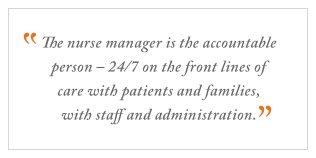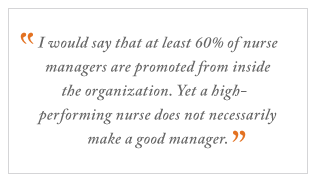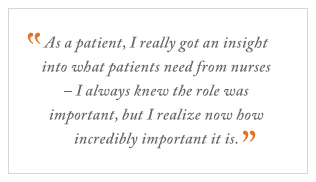Healthcare organizations have been worried, and rightfully so, about the steady stream of nurses exiting the profession and the relative trickle of nurses entering it, especially when compared to projected demand.
 |
How bad is the shortage? The Aging Workforce Survey conducted for Nursing Management in 2006 showed that 55% of surveyed nurses, most of them nurse managers, intend to retire between 2011 and 2020. The January/February 2007 issue of Health Affairs reported that the nursing shortage will triple over the next 13 years. And a report of the National Commission on Nursing Workforce for Long-Term Care, published in 2006, found that "On any given day, there are almost 100,000 vacant nursing staff positions" and that recruitment and training "are estimated to cost nursing facilities over $4 billion each year."
Hospitals have gone to great lengths to reduce the churn. They've created career ladders and flexible shifts, raised salaries, and added incentives like education sabbaticals -- yet nurses keep leaving. Clearly, something is wrong, and current efforts to fix it are inadequate.
That's what led two researchers to look at the problem from a different perspective: What makes nurses stay? What's more, what makes nurse managers, who are responsible for managing and motivating nurses, stay -- and stay engaged in their jobs?
The two researchers are Barbara Mackoff, Ed.D., a prominent leadership educator, a consulting psychologist, and the author of several books including Leadership as a Habit of Mind, and Pamela Klauer Triolo, Ph.D., RN, and Fellow of the American Academy of Nursing, who is the chief nursing officer of the University of Pittsburgh Medical Center and associate dean of academic-service partnerships at the University of Pittsburgh School of Nursing. With funding from the Robert Wood Johnson Foundation, Dr. Mackoff, the principal researcher on the project, and Dr. Triolo developed an assessment tool called the Nurse Manager Engagement Questionnaire and conducted a survey with 30 outstanding nurse managers from six medical settings. Instead of asking what drives nurses out, the researchers posed a series of unconditional positive questions to uncover what makes nurse managers more effective and engaged.
There is a lot to talk about. The interviews revealed 10 "signature individual elements" of successful nurse managers -- mission driven, generativity, ardor, identification, boundary clarity, reflection, self-regulation, attunement, change agility, and affirmative framework -- and five "dominant signature aspects of organizational culture" -- learning culture, culture of regard, culture of meaning, generative culture, and culture of excellence. In total, these signature elements are what keep nurse managers flourishing.
The results of the study, Why Do Nurse Managers Stay? Building a Model of Engagement, will be reported in the March and April editions of the Journal of Nursing Administration. In the meantime, Dr. Triolo and Dr. Mackoff discussed with the GMJ why they concentrated on nurse managers; the benefit of a success, rather than an attrition, model; and what hospitals should do to retain their best nurses.
GMJ: Why is there such high turnover among nurses and nurse managers?
Dr. Triolo: For one thing, we have an aging workforce, and a lot of our very talented, seasoned nurse managers are starting to think about retirement. But we also have difficulty attracting people into the job. It's a difficult situation. The nurse manager is the accountable person -- 24/7 on the front lines of care with patients and families, with staff and administration. Having done it myself, I can say it's definitely one of the most difficult [hospital] jobs.
Frankly, experienced staff nurses can make almost as much money as a manager makes. So they ask themselves, why should they put up with all the headaches [of the manager role] when they can just stay in their regular job and make almost as much money?
One thing that came out in this study is that we need to hardwire certain organizational variables into the job, the things that give nurses satisfaction. We need to make sure we're providing the [kind] of support that they need to be successful.
GMJ: Why did you choose to study nurse managers who are happy in their work instead of ones who are quitting?
Dr. Mackoff: We defined nurse managers as "engaged" -- not happy -- if they had been in the position at least five years and had been designated as excellent by their chief nursing officer. So it wasn't just enough for them to be happy on their job, they had to be outstanding and long-tenured.
Why did we ask about engagement instead of disaffection? When you're working from a research perspective, an attrition model can be a first step in identifying a problem. Yet those questions are based on a diagnostic model. Those questions are driven by loss, disappointment, sometimes anger. A success model looks at what's working and what people want more of; it's linked to solutions and the practical matters that change and enhance individuals, that transform cultures.
Questions that explore complaints are really different than those that seek aspirations and commitments. Finding the signature behaviors that allow nurse managers to succeed provides practical knowledge about how to keep them, and it tells us how to teach, train, and recruit and provide support for these behaviors.
When I'm looking for interventions, practical applications, and actionable research, I want to look at what's working. I want to find the people who somehow, despite all the difficulties of the role, have stayed in their settings for more than five years and are outstanding. That gives us a model for what we aspire to.
 |
From a leadership perspective, if I'm an executive in an organization and people are leaving a department or role, I want to know the factors that capture and engage the ones who stay in the setting and the particular behaviors, traits, and values they bring that allow them to become engaged in that way.
GMJ: Why did you study nurse managers rather than front-line staff nurses?
Mackoff: We really started in the middle, didn't we? There's alarming data about the exodus of nurse managers and their short tenure and high attrition, but there's a strong correlation between staff nurses' positive relationship with their nurse manager and their engagement and longevity. Ultimately, if you want to get the staff manager and staff nurse to stay, then you want to cultivate an engaged manager -- the manager is the key to staff nurse engagement.
We've also got an aging workforce and a projected leadership vacuum. When these nurses retire, the nurse manager is the person most likely to be in the leadership pipeline, to be in succession. So by starting in the middle, we can work both ways, toward engaging staff and leadership.
Triolo: It's also an under-researched area. There are a lot of studies on staff nurse satisfaction, but there isn't a lot on nurse managers. But in my book, the nurse manager role is the most important job in the hospital -- that and the chief nursing officer. If you've got strong unit-level leadership and a strong chief nurse, everything works. It is a pivotal job. Any time I go into a hospital or a health system, that's the job I begin to work on first -- developing the nurse manager's capacity -- because that's where the operations happen.
Mackoff: The nature of the nurse manager role creates a particularly difficult transition for a nurse. A nurse manager became a nurse in the first place because of a calling, dedication, value -- of direct patient care, of being at the bedside. So when nurses move from being a staff person with direct [patient] contact to the role of nurse manager, they face a lot of complexity to maintain the meaning of that role in order to stay engaged.
GMJ: It seems that the talents that make a great nurse aren't the same ones that make a great nurse manager.
Mackoff: Our study found some signature management behaviors that are linked to engagement and would be in any setting, but they aren't necessarily the behaviors that help keep nurse managers engaged. Managing other people to do the work that you were previously doing -- that aspect is universal to the middle manager role. Like a lot of managers, they are moved forward because of their technical competence.
Triolo: I would say that at least 60% of nurse managers are promoted from inside the organization. Performance is a factor for advancement -- high performance, high potential. Yet a high-performing nurse does not necessarily make a good manager.
Really great people have failed because too often, the assumption is that if you're great clinically and the doctors get along well with you and respect you, then you'll make a great manager. And that's not always true. So we've made a lot of mistakes in the nurse manager role that have created a systemic problem.
GMJ: What are the behaviors and traits that create engaged nurse managers?
 |
Mackoff: We found ten signature behaviors that were typical of this sample of nurses. One of the most crucial was generativity. It goes beyond mentorship; it's the capacity to find gratification and satisfaction in developing others. In a nurse manager, being able to create a legacy in your own image, groom a next generation, and give other nurses opportunities for autonomy and freedom is really important. One manager told me, "I'm growing a boss."
Another crucial behavior is called identification -- the ability to take pride in the accomplishments of the staff. That's why having a line of sight is so important. If a nurse manager can connect the phone calls, the paperwork, and the supervision to the actual care at the bedside, then he or she can maintain the meaningfulness of the work.
Boundary clarity was absolutely essential to these nurse managers. One of them said, "If I took this as a personal attack, I would never survive." That ability not to take intense feelings personally but instead to objectively solve the problem while not overreacting, that was also critical.
Another crucial behavior is the capacity for self-regulation; these engaged nurse managers were very skilled at learning lessons from experiences and being able to gauge the effect that their behavior had on other people. They could scan for cues about themselves and the way that patients, families, and staff members responded to them.
GMJ: You mentioned that having a "line of sight" was important. Did you mean that literally?
Mackoff: For any manager, in particular for a nurse manager who moves away from the bedside, the day-to-day experience of engagement in the original role gets lost. The nurse manager role is several steps away from what drew them to this work -- being mission driven was the most mentioned trait of those that emerged. Losing the ability to see their impact on patient care was kind of an "elephant in the room" for new nurse managers. It was very important to address maintaining that line of sight between your management work and the organizational mission, between your management work and the work of nursing -- to see how all the paperwork, phone calls, scheduling, and coaching and counseling really is about the patients and their families. They have to have a line of sight from their mission to what their staff is doing and to the patients.
Cultivating that line of sight can be done in very deliberate ways. Individual nurse managers can create a mission statement that links to the larger organizational mission, then talk about that periodically. It's such a crucible that they maintain that sense of meaning. It resonated throughout all the interviews: These nurse managers are meaning makers -- they look for meaningful work, and they have to be able to see that the management role is very much related to the outcomes of patient safety and patient care and to the patient's families and the staff. So line of sight is both metaphorical and literal.
GMJ: Would you recommend that nurse managers keep their offices in the unit?
Mackoff: Proximity is important, and so is time. Organizations need to be able to free up a nurse manager's time, with fewer meetings for example, so they can just walk the halls. If your nurse manager is always in a meeting, he or she is not identifying with the work of that unit. Organizations need to look at the best use of time for managers, then give them the time to do this juicy, fulfilling, generative work. Fewer meetings and an office nearby is absolutely right.
Triolo: When we take nurse managers away from their mission, move their offices off the units, and put them in meetings all day long, they get a disconnect with why they're in nursing in the first place, which is to grow and develop others and to help other people. When you separate someone from their mission, they're not going to be happy in their role, and they're not going to stay.
We in administration have created what we think is the job of the middle manager, but I don't believe it is the job of the middle manager. We've created a job on paper that really doesn't support the work that's needed.
GMJ: Dr. Triolo, do you still see patients?
Triolo: Yes, I do. I don't give direct patient care anymore, but I go in patient rooms and clinics. I make rounds regularly at our 19 hospitals. I get all my healthcare here; I've been a patient. I'm a five-year-out breast cancer survivor, so I got to see "the other side of the sheets," as we put it. I really got an insight into what patients need from nurses -- I always knew the role was important, but I realize now how incredibly important it is.
GMJ: You're asking for an awful lot of change. What makes you think that hospitals will do this?
Triolo: Because it will create more engaged and highly qualified nurse managers, and that's where the real work happens. When I think about the people I've known in my 30-year nursing career, the ones that I feel had the best blend of values and character, the ability to execute, manage change, and have some regulation and reflection about themselves, those are the ones who had great healthcare organizations. The nurse managers in this study are just like them.
-- Interviewed by Jennifer Robison
Great Nurse Managers: 10 Signature BehaviorsThe nurse managers that Barbara Mackoff and Pamela Klauer Triolo studied all shared certain characteristics that the researchers believe drive success and engagement in the nurse manager role.
|
